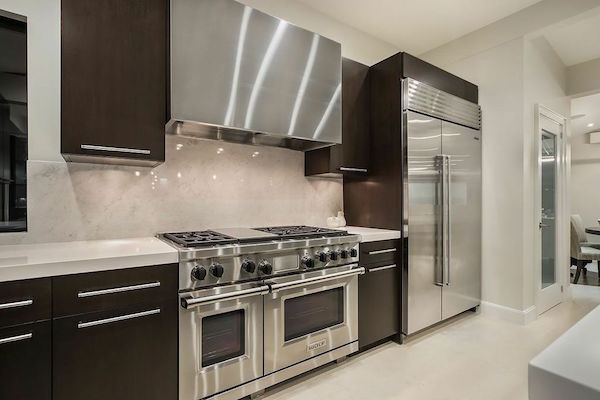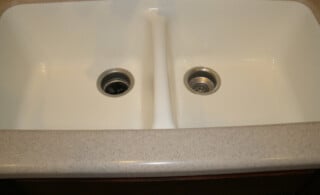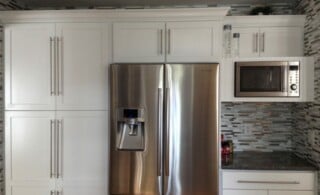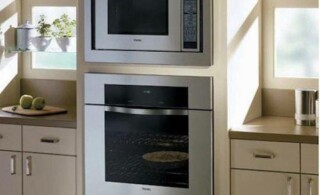
While major appliances make our lives much easier, they also pose significant risks if not maintained properly. Appliance safety is a matter of both keeping your appliances in good working order and using them as they were intended, as well. The average homeowner has several thousand dollars invested in major appliances; to protect your investment and ensure many years of reliable service out of each, it’s important to properly maintain your appliances.
Extension Cords and Appliance Safety
When it comes to appliance safety, one of the most commonly used, and commonly misused, gadgets on the market is the extension cord. Extension cords pose several risks. First, the extension cord connections may not be secure. Besides causing power fluctuations that may damage the equipment, poor connections can also result in sparks that could start a fire. Another problem with the appliances connected by extension cord is that they are extra vulnerable to water penetration. This is especially true in damp areas such as laundry rooms, bathrooms, kitchens, garages and outdoors. Water and electricity are a dangerous combination responsible for many avoidable deaths each year.
Extension cords also come in different sizes, and not every width is suitable for every appliance. People often make the mistake of using extension cords that are too small. The wires on extension cords are rated according to size, with lower ratings corresponding to larger sizes. A simple household extension cord for a lamp might have 16-gauge wire. An outdoor cord may have 14-gauge wire. Heavy-duty cords are usually 12-gauge. It is a good idea to plug things in directly to the socket or to a surge protector whenever possible; when an extension cord is necessary, make sure that it is large enough to handle the electrical load it is going to carry. In general, in those circumstances where use of an extension cord is unavoidable, employ one that is heavier than the wires already attached to the appliance.
Also, whenever using power tools or similar equipment on long extension cords, be aware that the longer the cord the more power that is lost en route. This phenomenon, called voltage drop, is much less pronounced in heavier wires. Whenever you use an inadequate cord, you run the risk of damaging the appliance or causing the wires to overheat and become a fire hazard.
When extension cords, appliance wires and outlets are incompatible, people often use adapters to make things fit. Most commonly, people have a three-prong plug and a two-prong outlet. The third prong is the ground, and it offers important safety advantages. A much better long-run solution is to have an electrician replace your 2-prong outlets with properly grounded three-prong outlets. Heavy-duty appliances have plug configurations that are unique. Never use an adapter to fit these into more standard outlets.
Ready to start your appliance safety?
Find ProsCircuit Breakers, Fuses, and Appliance Safety
Older homes have fuse boxes while most new ones have circuit breakers. Both perform the same function. Whenever a short circuit or overload situation occurs, the device shuts off electricity to that circuit, preventing both shocks and fire hazards. Whenever an appliance stops working, first test the outlet with a lamp or radio. If the circuit is dead, turn off anything you know to be on the same circuit and go to your electrical box, usually located in the basement. If you have a circuit breaker, look for the one switch that is slightly out of alignment. Turn it off and turn it back on again. If you have a fuse box, replace the burnt-out fuse.
If you try the appliance again and the circuit cuts off a second time, you may be overloading that circuit. Try the appliance in another part of the house. If it keeps causing circuits to cut off, something is wrong with the appliance and it should not be used.
Appliance Safety and Pilot Lights
Many older gas appliances (ranges, dryers, water heaters, furnaces, etc.) have pilot lights that run continuously. Newer models have electronic ignition instead. When an older appliance stops working, check to see if the pilot light has gone out. If it has, re-light it according to the instructions in the manual, which came with the unit or are printed on the appliance itself. Re-lighting pilot lights is a tricky business in some cases; if you no longer have the manufacturer’s instructions, are uneasy about lighting the pilot yourself, or smell gas when you enter your home, calling a service professional is probably the right thing to do. If the problem becomes persistent, it may be time to replace your old unit.
It is also good to remember that, because pilot lights are meant to maintain a flame at all times, they are always ready to ignite any flammable gases that might be present. This is why you should never store paints, solvents, and other chemicals anywhere near an appliance with a pilot light.
 Garbage Disposal Cleaning: Show Your Garbage Disposal Who Is Boss
Garbage Disposal Cleaning: Show Your Garbage Disposal Who Is Boss  Green Appliances
Green Appliances  How to Fix a Leaking Fridge
How to Fix a Leaking Fridge  Cutting-Edge Kitchen Appliances
Cutting-Edge Kitchen Appliances  Wall Ovens
Wall Ovens 

Are You Familiar With This Topic? Share Your Experience.